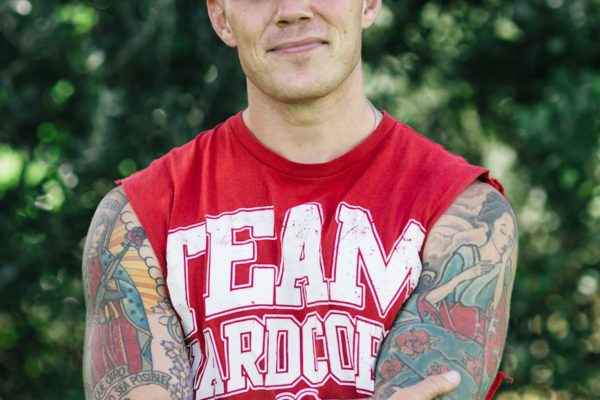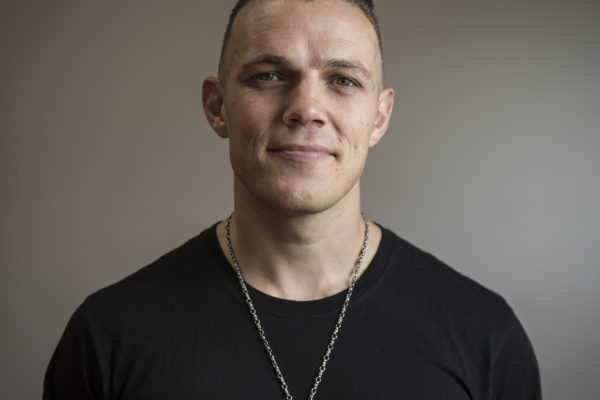Richie Hardcore is a well-regarded public speaker, MC, and former Muay Thai champion.
After a career in Muay Thai spanning 20 years, Richie left the ring to be a campaigner for social change, although he is still involved with the sport as a fight coach and personal trainer.
Richie lives in Auckland and is a board member of White Ribbon New Zealand. He is a Ministry of Social Development ‘It’s Not Ok’ Champion, working to educate and end violence against women. He is an educator and public speaker, focusing on exploring mental health, well-being, masculinity and ending rape culture, sexual and family violence. He often appears on TV and radio panels and shows discussing social issues.
Always making an effort to keep the PMA (Positive Mental Attitude), Richie’s day to day goal is to do and give his best, leaving the world a slightly better, healthier and happier place, than when he woke up.
Available for:
- Guest speaker
- Panel discussions
- Emcee
- Media commentary
- Blogging
“This afternoon was awesome! It was great that those who tuned in were open to what you were talking about. We have already had messages from the students telling us they got a lot from you. Thanks so much for your time - you have really connected with those who tuned in.”
Robyn HooperToi Ohomai
“Richie truly was awesome at our conference. I was lucky to attend one of his presentations (as the conference organiser I often don’t get to see the actual presentations) and I was gobsmacked at how amazing it was. His message was so well shared and he is so likeable and genuine which shines through. The feedback from the attendees has been nothing but positive and I am sure that we will want to have Richie back again.”
Lorraine CoulstonWhānau Manaaki Kindergartens
Here’s your chance to learn more about one of New Zealand’s most recognisable social change campaigners:
Can you tell us more about your depression, and how it affected your life?
My experience of depression has always been situational, a response to trauma that’s happened as an adult. My anxiety and depression first probably appeared in my early 20s, but I didn’t recognize it as such. Looking back, that’s definitely what you’d diagnose it as today. It came back in my 30s after some painful life experiences, and again I wasn’t really aware of what I was experiencing until experts pointed it out.
Learning is often retrospective I guess. Long periods of consistently low mood are called dysthymia, or persistent depressive disorder, and I lived with that for a long time. I got better but then life hit me with some painful events and I went through a period of chronic depression, but I’ve come through that and life feels fresh and amazing again. The early coping mechanisms I had in place proved to be really effective and I leant on them a lot; running, consistent therapy, sobriety; I was doing those things already and they helped my recovery a lot. When I was chronically depressed, medication helped at first, but the suicidal ideation always come back, so I stopped taking it, enrolled in a marathon and continued with my psychologist and those worked really well for me. That and having amazing, loving and supportive friends who would let me hurt and love me all the same. I’m very lucky to have such amazing people around me.
I’ve never been a substance abuser myself. I love my father very much. He was, is, an alcoholic. He’s been in recovery for many years now, and I’m very proud of him for the work he’s done to get and stay sober. The early experiences of chaos and instability I grew up with though, set me up to gravitate towards those feelings as an adult. So, invariably, I had a lot of emotional drama and harm from the people who’ve had substance abuse issues around me. While I don’t have a substance problem, I definitely have some of the addict like traits that come from being around people with addiction or abuse issues, so I’ve had to do a lot of unlearning and work on myself to not recreate what I’ve internalised since I was kid.
When and how did you discover Muay Thai? How did it change your life?
I was 13 when I started martial arts, and 17 when I started Muay Thai. An older guy in school was doing it and he encouraged me to come and try training, and I was hooked from day one. I was lucky to start at a Balmoral Leegar, a gym that started the careers of some of New Zealand’s and indeed the world’s best fighters, so I was fortunate to have amazing trainers and training partners to help me grow as a young fighter. They also were great mentors, who put me in a positive direction and a place to put my energy that was constructive. I had little to no self-esteem starting out as a teenager, but over the years the hard training and competitive fighting helped me grow as a person. It built me from the inside out, as much as the outside in. It gave me self-confidence, purpose, direction, taught me how to prioritize, say no, have the backbone to not go with the grain, and the ability to persevere. I could really go on, but there’s a tattoo on my leg that says ‘fighting saved my life’, and I really believe that to be true.
What’s one thing you’d change in New Zealand society right now, if you had the power?
If I could wave a wand, I’d eradicate the socio-economic inequality we have in this country. We are one of the most unequal countries by Gini Coeffecint measurement in the OECD, and that inequality is a driver of all manner of social problems. If we could fix this one problem, it would have so many positive ramifications.
What are the top three things most people struggle with when they first starting training with you?
I think for people with a low level of fitness, the hardest things are consistency, diet, and alcohol. Once they get into a routine, they feel better and want to put more good things and less of the bad into their body. Their mood elevates and it becomes a positive upwards cycle, but the sticking with it can be the hard part at the outset.
What’s one tip people can do for better mental health outcomes in their own lives?
Exercise more, it’s scientifically proven to make you feel better. You don’t have to run, or do crossfit or kickboxing – go for a walk, do yoga, go to a dance class, just move your body with some intention.
What are your aspirations for the next five years?
I’d love to speak internationally regularly. I want to reach as many people with positive, evidence-based ideas about how we can all make our own lives better, and make society better. We all have the power to improve the world, but we have to help ourselves first. If I can help people on that journey, that’s a super fulfilling thing to get out of bed for every day.
I’d love to make a great documentary. I’d also love to continue to train champion fighters, there’s so much more of the world I want to see, and if I can continue to travel speaking and coaching further afield, that would be a fun purposeful life.
What’s one thing most people don’t know about you?
I’m divorced. It’s been a hugely traumatic experience, perhaps the worst thing I’ve ever had to go through as an adult and it’s taken me a long time to work through, but strangely, it’s also humbled me and made me a better man. It’s a cruel irony that pain is a great teacher.


